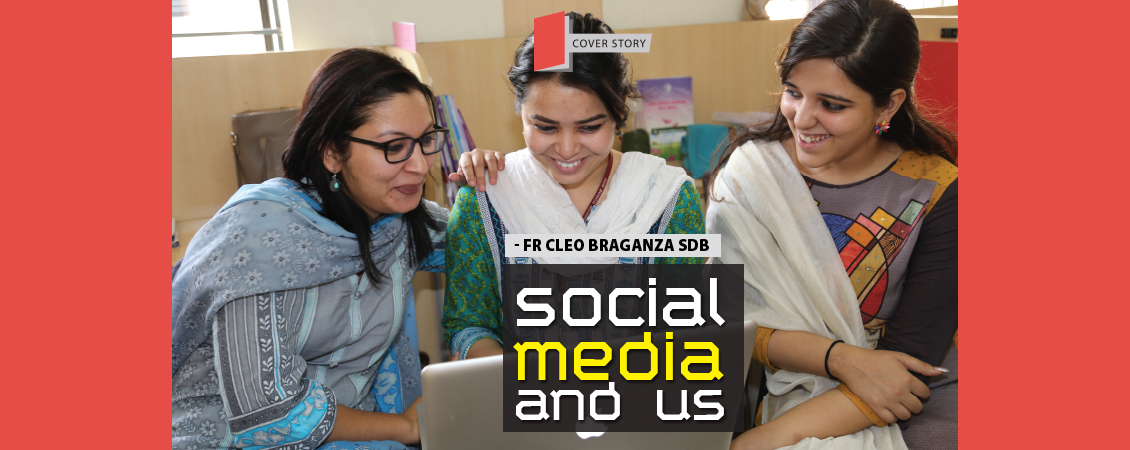“The internet is down! And I can’t update my Instagram account!!!” exclaims Sonia, exasperated with the lack of internet connectivity. Like Sonia, many youngsters and some adults consider social media apps like Whatsapp, Facebook, Twitter, Instagram, YouTube, SnapChat or Hike to be an essential dimension of their lives. Social Media has become a part of our world and is here to stay.
Rapid progress in communication technology in recent decades has enabled people to connect with many persons, cutting across geographical boundaries. It has helped businesses, services and institutions to expand their reach beyond local neighbourhoods and acquire a global clientele. Academicians and researchers are delighted with the extent of information available in a few keystrokes, while parents are content knowing that their children are just a mobile call or message away.
Parents and educators appreciate the benefits of the Internet, but they are alarmed at the flip side of social media… cyber-bullying, hacking, porn or online challenges like the Blue Whale game. Modern communication technology is a double-edged sword, and we need to be informed about its impact on the different dimensions of our lives, and how to judiciously handle it.
Personal life: Like a puppet on a string…
Today, many youngsters enjoy connecting with their peers and other persons through social media. They like the quasi-anonymous social interaction that it provides, and they feel it’s good for building up their confidence and self-esteem. Some of them, however, go to the extent where their moods and feelings depend on the likes, comments or reactions they receive. Instead of enjoying their unique daily experiences, they compulsively take photos and videos of mundane activities and post them for public consumption. Such over-dependence on social media can even cause personality and brain disorders (like self-centredness, narcissism, anxiety, depression, ADHD, etc.).
Personal Data: Look at me!
Some people love to flaunt their status, their friendships, their achievements and their latest gadgets… together with their full name, address and contact numbers. They forget that they can fall prey to identity theft, misappropriation of personal data, access to their private images / videos and subsequent blackmail. Besides, many popular apps keep track of personal information and store details of individuals without the user’s realising it. There is also no sure way of verifying if an attractive friendship request comes from a real person or a scammer operating a fake identity.
Use of Time: Social media doesn’t obey the clock…
People like the fact that the Internet and social media help them communicate rapidly and get jobs done efficiently. Students justify prolonged use of social media saying it helps them in their studies (by facilitating group discussion/work, sharing resources). While it’s true that the Internet helps people save time and effort, it could also become a distraction, leading to decreased performance in school or at work. You say you’ll check your messages for just five minutes, but then you get carried away for 15, 30 or 50 minutes… and before you know it, you’ve lost time meant for study, work or an assignment. Tragic accidents have also happened because a person was busy on his mobile while walking on the street or crossing the road.
Access to knowledge: You get what you look for…
The Internet and social apps have facilitated access to knowledge and information. You don’t need to go to a library or borrow an encyclopaedia when you can find what you wish through an online search. Youngsters love media sharing apps through which they exchange videos, music and other content. But getting information so easily can have a detrimental effect on learning, thinking critically and creative expression. At the same time, if you aren’t careful, the ‘knowledge’ you acquire online may well be misleading, tendentious or fake altogether. People often furiously forward social media messages without verifying them, thus leading to the proliferation of fake news, rumours or vicious propaganda.
Ethics: Living life my way…
Interaction with peer or support groups can often have a strong influence on the attitudes and behavioural choices of persons, for better or for worse. The Internet and social apps also facilitate easy and unbounded access to morally questionable content (violence, porn, depraved ideologies) and practices (sharing pirated software/media, revenge posts, sexting). For many youngsters, social media offers a place where they have no boundaries, and where they can ‘do things their way.’ This behaviour is ethically and practically harmful, because institutions and employers increasingly conduct social media profile checks on potential students and employees.
Professional and Personal Relationships: Friends galore, risks too…
Social apps can help people connect with others having similar interests, as well as join professional networks and find better jobs. At the same time, unbounded use of social media can become a distraction from work, or lead to breach of confidentiality and professional boundaries. Undiscriminating social media users can be at risk of getting involved with persons having ulterior motives, who use fake identities to engage in emotional manipulation, cyber bullying (online abuse, harassment, blackmail) or setting up a violent/exploitative physical encounter.
Parent-Child relationships: Near and yet so far…
Today many parents give their children mobiles and smartphones so that they can easily contact them or keep tabs on them. VoIP calling apps (Skype, WhatsApp, Hike) have become extremely popular with families whose members live far away for reasons of study or work. However, the same devices which keep family members in touch with one another, can also be the cause of straining of relationships. It isn’t uncommon for family members to be together at home, with each person busy on his/her electronic device to the detriment of family bonding.
Commerce: Making it work for you…
The Internet has facilitated low-cost communication and speedy financial transactions, which are a boon for business. Free and open-source software (like Android, Mozilla, Open Office, Google) bring the power of computing and the internet to the masses. Many start-ups and established enterprises use social media interactions, feedback and ratings to garner funds and boost their sales. However tech-savvy criminals can also use technology to hack into computers, steal bank card details or siphon business data. Unscrupulous persons and businesses use pirated software in a bid to cut costs, but ultimately end up being victims of malware, viruses and trojans.
Socio-Political issues: Building or breaking society…
Social media has the power to reach out to the masses, to dispel prejudices, educate people about social issues, demand transparency and efficiency in governance, and influence important state decisions. Unfortunately, it is also being used to spread prejudice, hatred, discrimination and violence against particular individuals and groups. Social apps are employed to promote worthy causes, but can also be misused to gather support for anti-social, communal or extremist agenda.
Social Media popularity is not a passing fad; it is part of the new normal in our world. As such, instead of ignoring, vilifying or rejecting it, parents and young adults would do well to grow in awareness about its modalities, its benefits and undesirable consequences. Parents and educators also have the responsibility to educate the younger generation to the balanced use of social media, as well as verifying and monitoring its actual use by children. We need to learn to harness its capabilities to establish meaningful relationships, instil knowledge with values, encourage ethical business sense, and promote harmony in society.
Cleo Braganza is a Salesian priest engaged in parish ministry in Mumbai. He likes using modern technology for pastoral work.
Fr Cleophas Braganza SDB
To subscribe to the magazine, click Subscribe





